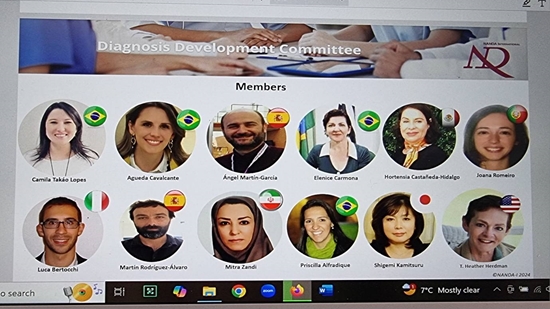Shahid Beheshti University of Medical Sciences: A Pioneer in Advancing Nursing Diagnosis in Iran

We are honored to introduce Shahid Beheshti University of Medical Sciences as a pioneer in the field of Nursing Diagnosis in Iran. This University recently joined the NANDA International Institute to help pave the way for new Iranian nursing students and familiarize them with the concept of nursing diagnosis and related terminology. In this effort, Dr. Mitra Zandi, a faculty member at Shahid Beheshti University of Medical Sciences, School of Nursing and Midwifery, took a significant step by becoming one of the 12 members of the NANDA International Diagnosis Development Committee for 2024-2025. This committee includes representatives from the U.S., Italy, Brazil, Portugal, Japan, Spain, and Mexico, and now Iran has its own representative in this prestigious institute. Recently, Dr. Zandi was appointed as the coordinator for Iran-NANDA academic and clinical contributions. In this role, she serves as the facilitator of Iran-NANDA nursing knowledge exchange, advances evidence-based nursing practices, and promotes the integration of standardized nursing terminology. Additionally, she supports nursing education and research initiatives aligned with the NANDA-I mission.
NANDA International was established in 2002 to pursue its core objectives of continuously evaluating novel nursing diagnoses submitted to international systems and refining existing ones to enhance their accuracy in clinical decision-making, ultimately improving public healthcare outcomes. This institute strives to advance Standardized Nursing Language worldwide, highlighting the distinctions between clinical and nursing diagnoses while reinforcing their shared purpose: ensuring high-quality, timely clinical diagnoses that lead to better patient responses to treatment.
In line with the goals mentioned earlier On April 22, 2025, a webinar on Nursing Diagnosis was held with contributions from NANDA Institute, Shahid Beheshti University of Medical Sciences Department of International Affairs, and SBMU School of Nursing and Midwifery. The session aimed to provide a comprehensive introduction to the topic for the Heads and academic staff of Shahid Beheshti University of Medical Sciences while addressing their questions.
Although Nursing Diagnosis has been explored in Iranian universities, gaps remain that require reliable and authentic clarification. Prof. Laura C. Rossi, President, Board of Directors in NANDA International, insightfully explained these concepts, and brought much-needed clarity to the discussion.
During the session, the relationship between medical and nursing diagnosis was examined. While medical diagnosis serves as the foundation for treatment plans, nursing diagnosis plays a critical role in guiding patient follow-ups by factoring in their family, social, ethnic, and financial backgrounds. Nurses, with their close daily interaction with patients, can assess and apply this information effectively to discharge advice and ongoing care.
This assessment process follows Gordon’s Functional Health Pattern, which evaluates individuals through 11 key patterns. How nurses organize and interpret this data ultimately shapes the diagnostic process, and improves the accuracy of hypotheses and the effectiveness of care strategies.
Prof. Rossi described these steps as a standardized international nursing language—a framework that, despite its thoroughness, provides a holistic perspective. It identifies obstacles in treatment and facilitates better patient responses. Nurses do not just see a case in need of medical intervention; they see a person, with unique traits and lived experiences. These assessments bridge gaps in understanding, ensuring care that is both informed and individualized.
A series of webinars will be held in the near future to further share experiences and knowledge with academic staff and members of the NANDA International Institute. These efforts aim to ensure that this valuable expertise reaches new nursing students while also raising awareness among the general public about the vital role nurses play in healthcare centers.
This collaborative initiative aligns closely with the United Nations Sustainable Development Goals, particularly Goal 3: "Good Health and Well-being." By promoting evidence-based nursing education, standardizing care language, and empowering nurses in their diagnostic roles, SBMU contributes to improved healthcare quality, reduced disparities in care delivery, and stronger health systems. These efforts not only advance the academic and clinical landscape in Iran but also foster global cooperation in nursing science, thereby supporting equitable and resilient healthcare for all.

.png)
Comment